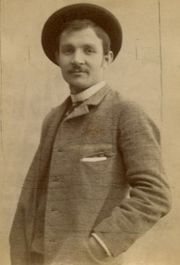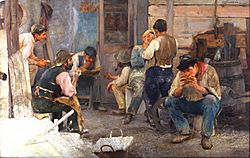Pío Collivadino facts for kids
Quick facts for kids
Pío Collivadino
|
|
|---|---|

Collivadino, c. 1900
|
|
| Born | August 20, 1869 |
| Died | August 26, 1945 Buenos Aires
|
| Nationality | Argentine |
| Known for | Painter |
|
Notable work
|
La hora del almuerzo (1903) Usinas (1914) |
| Movement | Post-impressionist |
| Awards | Gold medal, Universal Exposition of 1904 Order of the Crown of Italy, 1905 |
Pío Collivadino (August 20, 1869 – August 26, 1945) was an Argentine painter. He is known for his Post-impressionist style of art.
Contents
Early Life and Art Studies
Pío Collivadino was born in Buenos Aires, Argentina, in 1869. He started learning to draw at an Italian-Argentine cultural society. In 1889, he traveled to Rome, Italy, to study art even more.
In 1891, he was accepted into a very famous art school called the Accademia di San Luca. There, he learned from a great teacher named Cesare Mariani. Pío even helped paint large pictures on walls, called frescoes, in an important building in Italy.
Becoming a Famous Artist
Collivadino returned to Argentina in 1896. He became well-known for his romantic-style pictures, especially his lithographs. These are artworks made using a special printing method.
He showed his art at big international festivals in Venice, Italy. From 1903 to 1907, his painting La hora del reposo (which means Workday Break) won a gold medal. This painting is also known as La hora del almuerzo (Lunch Break Time).
In 1904, he also won a silver and a gold medal at the Louisiana Purchase Exposition in St. Louis, USA. These successes encouraged him to try a new art style called Post-impressionism. This style was not yet popular in Argentina.
The Nexus Group and New Styles
In 1907, Collivadino joined a group of artists called the Nexus Group. This group included famous painters like Fernando Fader and Martín Malharro, and sculptor Rogelio Yrurtia. At first, people didn't like their new art style. But the Nexus Group helped make Post-impressionism popular in Argentina.
Because of his artistic achievements, Collivadino received an award from Italy in 1905 called the Order of the Crown of Italy. He also became an honorary member of another famous art school, the Accademia di Brera, in Milan.
Leadership in the Arts
Pío Collivadino was very respected in Argentina. He was often asked to be a judge for art competitions. In 1908, he became the Director of the Academy of Fine Arts. He also played an important role in Buenos Aires' big Centennial International Exposition in 1910.
In the years that followed, Collivadino created some of his most famous works, like Usinas (Power Plants), painted in 1914. He also became the director of scenography (designing stage sets) at the famous Colón Theatre. He continued to lead the Academy of Fine Arts and teach there until he retired in 1935.
Even after retiring, he helped create new art schools. He helped organize the Prilidiano Pueyrredón School of Fine Arts in 1939. He also helped start the Ernesto de la Cárcova Museum in 1941. Collivadino was the director of the Pueyrredón School until 1944. He had to retire then because of a new military government that didn't like European art styles.
Pío Collivadino passed away in Buenos Aires in 1945, at the age of 76. He left behind a legacy as an important painter and a leader in Argentine art.
See also
 In Spanish: Pío Collivadino para niños
In Spanish: Pío Collivadino para niños
 | Audre Lorde |
 | John Berry Meachum |
 | Ferdinand Lee Barnett |


